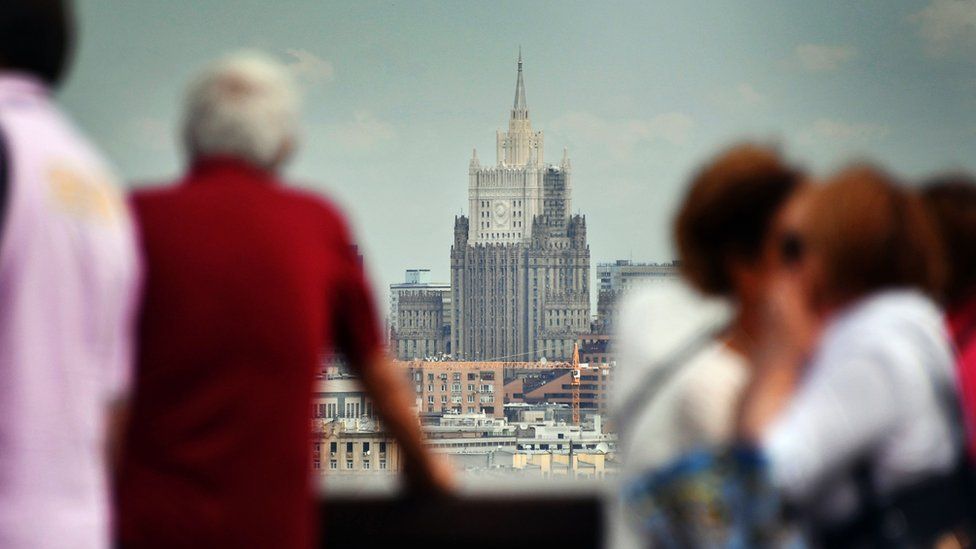Russia's Putin orders 755 US diplomatic staff to be cut
- Published

Russian President Vladimir Putin has announced that 755 staff must leave US diplomatic missions, in retaliation for new US sanctions against Moscow.
The decision to cut staff was made on Friday, but Mr Putin has now confirmed the number who must go by 1 September.
It brings staff levels to 455, the same as Russia's complement in Washington.
This is thought to be the largest action against diplomatic staff from any country in modern history, says the BBC's Laura Bicker in Washington.
The number includes Russian employees of the US diplomatic missions across Russia, the BBC's Sarah Rainsford in Moscow adds.
Staff in the embassy in Moscow as well as the consulates in Ekaterinburg, Vladivostok and St Petersburg are affected, she says.
The US said the move was a "regrettable and uncalled for act".
"We are assessing the impact of such a limitation and how we will respond to it," a state department official said.
It is not known exactly how many US citizens are employed in the diplomatic missions currently. However, a State Department Inspector General's report in 2013 said more than 900 staff members were "local hires", with only 301 "direct-hire" staff, meaning it seems likely a far lower number than 755 will be actually forced to leave Russia.
Mr Putin did strike a conciliatory note, saying he did not want to impose more measures, but also said he could not see ties changing "anytime soon".
Mr Putin told Russian television: "More than 1,000 people were working and are still working" at the US embassy and consulates, and that "755 people must stop their activities in Russia".
Russia has also said it is seizing holiday properties and a warehouse used by US diplomats.
Mr Putin suggested he could consider more measures, but said: "I am against it as of today."
He also noted the creation of a de-escalation zone in southern Syria as an example of a concrete result of working together.
However, in terms of general relations, he added: "We have waited long enough, hoping that the situation would perhaps change for the better.
"But it seems that even if the situation is changing, it's not for anytime soon."
Analysis: Russian hopes dashed
by Jonathan Marcus, BBC News, defence and diplomatic correspondent
Russia hoped for a change in the climate; one where the lifting of many of the western sanctions imposed after its annexation of Crimea might become possible.
But more than this, it wanted a new deal between the US and Russia that would acknowledge Moscow as an equal diplomatic player and indeed as a partner in trouble spots, such as Syria, and in the wider struggle against Islamist terror. These hopes have now come to nothing.
The BBC's Sarah Rainsford tries to get Russian pop star Emin Agalarov to comment on his links to Donald Trump.
Russia seems to have placed unrealistic hopes in what President Trump might achieve. Did Mr Putin see him as a forceful like-minded character, or as a political and diplomatic lightweight that might be manipulated and dominated?
Either way Russia's own actions in intruding into the US political space and the subsequent investigations, have precluded any fresh start. Russia perhaps failed to understand the Congressional hostility to its activities, mistaking the Trump insiders' lack of concern for the predominant view of the president's supporters on Capitol Hill.
The new US sanctions were in retaliation both for Russia's annexation of Crimea in 2014 and Russian interference in the US election.
In December, the Obama administration ordered the seizure of two Russian diplomatic compounds and expelled 35 Russian diplomats in response to alleged hacking of the US Democratic Party and Hillary Clinton's campaign.
The new US sanctions on Russia were overwhelmingly approved by both houses of Congress, despite objections from President Donald Trump who wants warmer ties between the two countries.
The White House said on Friday that he would sign the sanctions bill after fears he could veto it.
Mr Trump was believed to be particularly concerned about a provision in the new bill that limits his ability to lift sanctions - forcing him to consult Congress first.
Some European countries are also angry because the new law could penalise European companies that invest in big Russian oil and gas projects such as the new Nord Stream II pipeline.
US intelligence agencies believe Russia tried to sway the election in favour of Mr Trump and now there are several investigations looking into whether anyone from his campaign helped.
Russia has always denied interfering and Mr Trump insists there was no collusion.
- Published28 July 2017
- Published24 July 2019
- Published14 September 2018
- Published3 August 2017